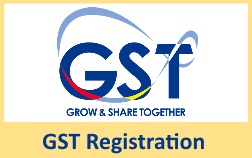Why Singapore GST Registration is Crucial for Your Start-up
Why Singapore GST Registration is Crucial for Your Start-up
Blog Article
The Ultimate Overview to Streamlining the GST Registration Refine and Requirements for Local Business Owners

Recognizing GST Basics
To realize the fundamentals of the Goods and Solutions Tax Obligation (GST) system, local business proprietors should initially recognize its underlying principles and effects. GST is a value-added tax obligation levied on a lot of items and solutions for residential usage. It intends to simplify the taxes procedure by replacing numerous indirect tax obligations imposed by the state and main federal governments. Under the GST regime, services are required to accumulate and register tax obligation in support of the federal government, ensuring openness and compliance.
Among the vital concepts of GST is input tax obligation credit, which permits organizations to assert credit score for taxes paid on their purchases. This system stops the plunging impact of taxes and advertises efficiency in the tax system. Additionally, GST is a destination-based tax obligation, suggesting that the tax obligation is imposed at the point of consumption rather than the point of beginning. This makes certain fair distribution of tax revenue among states based upon where the solutions or products are consumed. Comprehending these standard principles is vital for small company proprietors to browse the complexities of the GST system and make sure compliance with the law.
Qualification Criteria for Registration
Having developed a foundational understanding of GST concepts, small company proprietors should currently satisfy certain eligibility standards to continue with the enrollment procedure. In India, entities took part in the supply of goods or services with an annual accumulation turn over exceeding Rs. 40 lakhs (Rs. 10 lakhs for unique classification states) are called for to sign up for GST. Additionally, certain organizations such as those included in inter-state supply of goods, casual taxed persons, and those needed to pay tax under the reverse fee mechanism should register for GST regardless of their turn over. Businesses that were registered under the previous tax program (VAT, service tax obligation, and so on) are additionally mandated to sign up under GST. However, agricultural companies that only provide produce out of primary manufacturing are excluded from GST enrollment. It is crucial for organization proprietors to meticulously analyze their qualification based upon these requirements to make sure conformity with the regulation and stay clear of any type of charges for non-compliance.
Documents Required for GST Enrollment

Simplified Registration Refine Steps
Adhering to the collection and verification of the requisite documents, the registration procedure for GST can be browsed with a collection of simplified actions designed to assist in reliable compliance for local business owners. The initial step includes checking out the GST site and choosing the 'New Registration' option. Consequently, the applicant should load in Component A of the GST REG-01 kind with details such as PAN, mobile number, and e-mail address to acquire an OTP for confirmation. When the OTP is received and gotten in, a Temporary Reference Number (TRN) is produced for further procedures. The he said next step calls for submitting Component B of the kind with required business details, posting supporting records, and finishing the verification process utilizing DSC or EVC. Upon effective verification, an Application Recommendation Number (ARN) is issued, suggesting the completion of the GST enrollment process. By adhering to these simplified actions, local business owners can efficiently register for GST and guarantee compliance with tax regulations.
Tips for Ensuring Conformity
To keep governing adherence and operational integrity, persistent oversight and positive procedures are crucial in making sure compliance with GST needs for tiny service owners. Small company owners must remain updated with GST laws, submitting deadlines, and any type of modifications in tax prices to stay clear of penalties and preserve a great standing with tax authorities. One important pointer for conformity is to keep comprehensive and exact records of all purchases, consisting of expenses, invoices, and invoices associated with GST. Consistently resolving economic documents with GST returns can assist in determining and rectifying any type of disparities promptly. In addition, conducting routine inner audits or looking for specialist help can guarantee that business is adhering to all GST guidelines properly. It is additionally important for tiny business owners to purchase GST-compliant bookkeeping software that can simplify the tax declaring procedure and lessen errors. Last but not least, going to GST recognition workshops or training programs can boost understanding and conformity with GST regulations, eventually benefiting business in the future.
Verdict
In verdict, small company owners need to recognize the basics of GST, satisfy the eligibility requirements, collect necessary documents, and comply with the streamlined enrollment procedure actions to make certain continue reading this compliance. By streamlining the GST enrollment procedure and requirements, local business proprietors can stay clear of charges and operate their businesses efficiently within the legal structure - Singapore GST Registration. It is vital for little company proprietors to stay informed and certified with GST guidelines to maintain a successful business procedure
Small organization owners looking for GST registration have to ensure they collect and send the needed documents to finish the registration procedure effectively. The records needed for GST enrollment normally consist of evidence of business registration or incorporation, PAN (Irreversible Account Number) card of the company address, identification and entity evidence of the promoters/partners/directors, photos, address evidence of the place of company, financial institution account statements or terminated cheques, and consent forms. Going to GST recognition workshops or training programs can enhance understanding and compliance with GST laws, ultimately benefiting the service in the lengthy run.
By simplifying the GST enrollment procedure and requirements, little service proprietors can avoid charges and run their organizations smoothly within the lawful framework. It is critical for tiny service proprietors to remain informed and compliant with GST policies to keep a successful business procedure.
Report this page